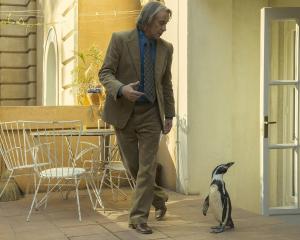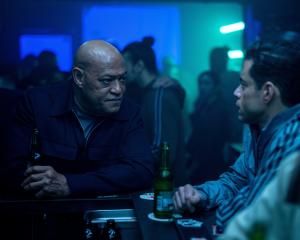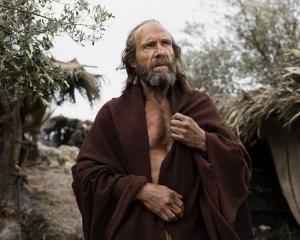A willingess to go anywhere and try "near anything" has led Gus Roxburgh on a determined career quest to meet interesting people while pursuing a lifestyle of adventure and variety.
There is the 12 years he spent as a Wanaka heli-ski guide and the gruelling 24-hour stints as a "terrier" cameraman following teams in the Southern Traverse Adventure Race through Fiordland's rugged mountains.
He's hand-fed lions, walked on fire, travelled around the US for a television series without using petrol, undergone oxygen-depleting high-altitude tests and also been hypnotised for pain-tolerance testing.
Most recently, Roxburgh has been involved as a producer behind a documentary profiling the violent gang culture of Los Angeles.
The latter project is one that seems far removed from a career lifestyle which has revolved around travel, the outdoors, and its attractions of snow, surf, and adventure.
Roxburgh was a producer working alongside critically-acclaimed film director - and one of the pioneers of professional skateboarding - Stacey Peralta on a film documenting the dog-eat-dog world of South LA's gangs.
The documentary, Crips and Bloods: Made in America, lifts the lid on the violent lifestyles of two of Los Angeles most notorious gangs and traces the origins of their bloody four-decades-long feud.
The independent film has recently been nominated for an Emmy Award in the best documentary category by the Academy of Television, Arts and Sciences.
Roxburgh's documentary role as producer involved a host of overview responsibilities, which included liaising with director Peralta on creative directions to keeping the project's budgets, logistics, and crew "all on track".
He also found himself thrust into the unusual role of having to self-distribute the film on its completion.
US film studios have closed down many of their "independent" divisions, which used to handle the release of most independent films and docos, as the effects of piracy and illegal downloading hit home, Roxburgh says.
However, the self-described "jack-of-all-trades" said the setback provided a huge learning curve.
"The upshot of it was I took the distribution on myself. We managed to get the film Oscar-shortlisted, got ourselves a theatrical release in 20 cities, and a TV sale to PBS (US television network Public Broadcasting Service),
"It's been a hard slog but things like the Emmy nomination really make it worthwhile," he said.
Roxburgh also secured a New Zealand "premiere" of the documentary in Wanaka, when he arranged for a screening at Cinema Paradiso earlier this year, as a fundraiser for the Kahu Youth Trust.
Producing Crips and Bloods was an incredible experience, which gave him an insight into a world most people in LA never see, he said.
"Like most big cities, LA is very segregated. The wealthy in Bel Air might only be four miles from the poor in South LA, but they may as well be in different countries,
"There is a line in the film that talks about how South LA is surrounded on four sides by freeways. You never actually have to go there and most Angelenos don't," he says.
While the area has a violent side to it, South LA is also one of the more vibrant and dynamic parts of the city, Roxburgh says.
"Most of the people we met just wanted their story told. Most of them don't want to be stuck in the dead end that is gang life. It's not a choice."
A lack of economic opportunities combined with a breakdown of the traditional family unit and the lack of real male role models or father figures made it hard for many to escape the cycle of gang life, Roxburgh says.
"For many the gangs are a de facto family, an identity, which can provide protection in a very violent community,"Filming and being accepted into South LA's gang community took time, he says.
"We had to be very careful during filming - to get insurance cover we had to buy bulletproof vests for the crew, we just didn't wear them.
"We spent a long time building relationships before we went in with cameras. Once we had the blessing of the guys who run the various neighbourhoods, access was easy."
Roxburgh describes his move from Wanaka to Los Angeles as a shift "from the sublime to the ridiculous".
"I went from a town with not even one traffic light to LA. You couldn't get much more different," he saysHowever, being based in Santa Monica on California's Pacific coast , he enjoys a lifestyle which has similar qualities to those which attracted him to Wanaka.
He originally gained a degree in resource management and worked in that industry before "segueing" into film and television.
"I started work as a freelance photojournalist as a way to get to interesting places and meet interesting people. Eventually I started picking up video cameras and because I had some solid outdoor skills I started getting cameraman jobs.
"Pretty soon I was writing and researching for television, then directing and producing,"Roxburgh's career path was unclear to him when he left school, when there were no "icons" like Peter Jackson to look up to in New Zealand.
"If you were good at English you became a lawyer, science a doctor or an engineer. I got a good general degree and became a ski bum!
"His willingness to try anything has helped shape his career, he says.
"I think the Kiwi `can-do' attitude goes a long way in the film and TV business. Working in the industry at home you really learn that and you have to be able to step into any role.
"LA is pretty much the global centre, so it's been hugely stimulating being here, but those values and all-round production skills have helped here.
"The more value you can provide the more likely you are to get good work."
Roxburgh says he can see some similarities between South LA's gang culture and a parallel escalation in New Zealand's situation.
"The 'gangsta' image has been 'sold' and glamourised by the music and film worlds to a certain extent which has seen the LA gangs with strong identities like the Crips and Bloods spread to other parts of the world, such as New Zealand," Roxburgh says.
One major and obvious difference between LA and New Zealand's gangs was the US gun culture.
"This has really upped the violence. There are so many guns in the hands of gang members, many of them serious automatic assault weapons. When you have 11-year-olds carrying pistols - as a society you are in trouble,
"The underlying causes of gangs are similar the world over, Roxburgh believes, and South LA was a lesson in "what not to do".
Told of New Zealand's recent problems with the increasing use of guns by criminals and calls for police here to be armed, Roxburgh says he understands the difficulties police face.
"I'm no expert, but I firmly believe more guns is not the answer. The police are in a difficult situation, but we need to find a way to break the cycle of violence, not escalate it.
"The lack of control on guns is a huge problem in the US. If one side arms itself, the other tends to just get bigger guns."












